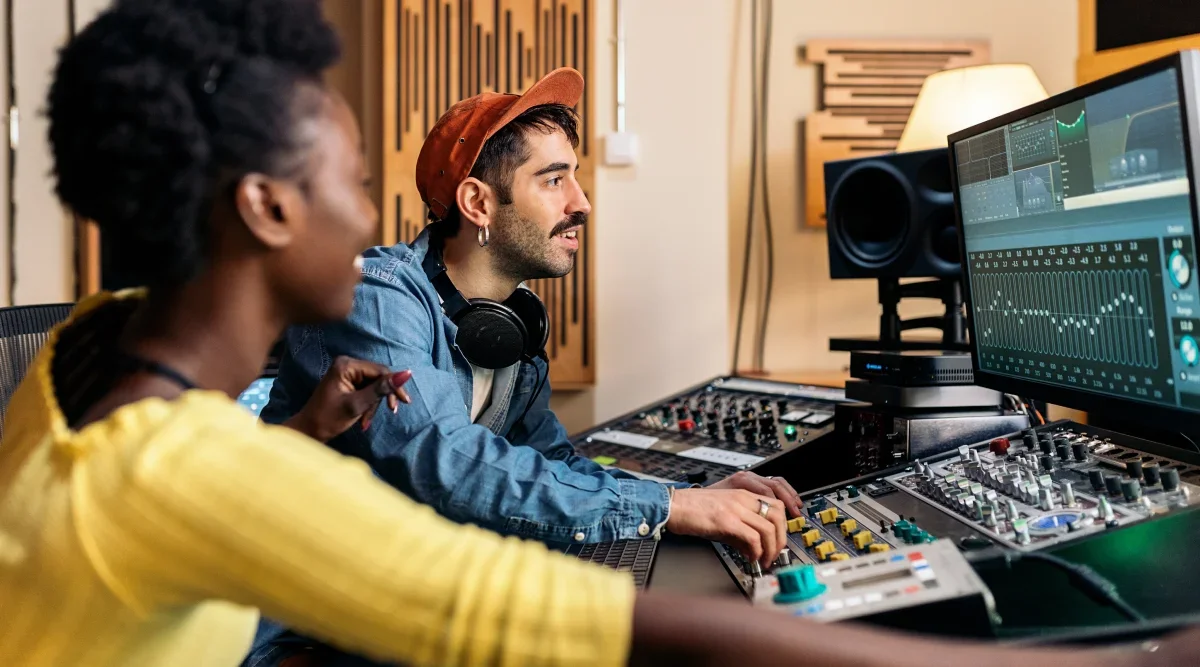As a songwriter, you’re already a copyright owner. In fact, your music and lyrics are protected by copyright law as soon as you write or record them, even if it's just a rough recording on your cell phone.
But to get the full benefit of copyright protection, including the right to sue people for infringing on your copyright, you must register it with the U.S. Copyright Office.

How copyright protects songs
For a song written, recorded, or performed in the United States, federal law grants creators the exclusive rights to do the following:
- Reproduce the copyrighted work: Control who can make copies of your songs, recordings, or sheet music.
- Prepare derivative works: Decide who can create adaptations of your song, such as remixes or samples.
- Distribute copies: Determine who can sell or share your song for profit—whether through streaming platforms, physical albums, or out of the trunk of a car.
- Perform or display the copyrighted work: Control how your song is presented to the public, including live performances, streaming, and lyric displays. For sound recordings (i.e., the song track itself), these rights only cover digital streaming platforms or satellite radio (not traditional AM/FM broadcasts).
These rights take effect the moment you create your song—whether you write it down or record it. However, a registered copyright establishes you as the original author on public record, which then allows you to take legal action in federal court if someone infringes on your copyright.
Types of song copyrights
You can register a copyright for musical compositions, sound recordings, or both. Here’s what to consider for each option.
- Musical composition: Also known as a musical work, these are the components that make up your song—such as the lyrics, melody, and rhythm. A musical composition can be expressed through sheet music, written lyrics, or similar tangible formats.
- Sound recordings: A song performance captured in a recorded format, such as a digital file, CD, or vinyl.
- Dual registration: You can register multiple copyrights at once—up to ten unpublished works, or up to twenty musical compositions or sound recordings (if part of the same album).
Keep in mind that ownership rights can vary across these copyright types. For instance, you could be the sole author of the musical composition but share rights to the sound recording with producers or other musicians. Or, you might be the performing artist while another songwriter holds rights to the underlying composition.
How to get a song copyrighted
Before registering your copyright, your song must meet two requirements to qualify for legal protection: it must be original (i.e., not copied from someone else) and fixed in a tangible form, such as sheet music or a recording.
Then, you can decide how to register your copyright. You can either follow the steps below or work with LegalZoom—just answer a few questions, and we’ll help you complete your application, usually in about 15 minutes or less.
Step 1: Prepare the necessary materials
Whether you use LegalZoom or submit the application yourself, you’ll first need to gather all the required materials.
- For a musical composition, this might be copies of your music, lyrics, or a similar tangible medium that expresses your musical work.
- To register sound recordings, you’ll need to submit your song in a digital format like an MP3 file.
You can also gather the names of anyone who contributed to creating the song. This includes co-writers, composers, producers, audio engineers, or others who deserve to be attributed as an author.
Step 2: Create an account with the U.S. Copyright Office
Next, you can sign up for an account with the Electronic Copyright Office (eCO) Registration System. This is where you’ll submit and manage all music copyright registrations. Here’s an overview of each type you can submit.
- Single application: For one song with a single author and owner. This can’t be used for works made for hire (such as if you wrote a song for a client).
- Standard application: This covers songs with multiple creators, works made for hire, and derivative works.
- Group registration of works on an album (GRAM): Register up to 20 songs from the same album at once. You can register musical works OR sound recordings but can’t mix both in one application.
- Group registration of unpublished works (GRUW): Register up to 10 unpublished songs under one application, provided all songs share the same author(s). This option also allows you to register musical compositions and recordings together.
You can find these application types listed in the left column of the eCO homepage. If you don’t complete your application in one sitting, be sure to save your progress so you can come back later.
Step 3: Complete the online application
After you select which application to submit, the system will guide you through each section. Along with the materials you’ve already gathered, you’ll need to provide your song’s title, authorship information, when it was created or published, and similar information.
If you’d rather fill out a physical application, you can submit the following forms to the U.S. Copyright Office (see the mailing address on the last page):
However, online registration is faster, costs less, and allows you to track your application’s status.
Step 4: Pay the filing fee
The exact cost of your music copyright registration depends on which application you submit. For reference, if you’re registering only one song you write by yourself, you’ll pay $45 for a single application. For a song that doesn’t qualify for a single application (such as a song with multiple creators), you’ll pay $65 to submit a standard application.
Keep in mind that these figures are subject to change, so you should review the latest fee schedule to confirm what you’ll pay.
Step 5: Upload a copy of the song
After payment, you’ll need to submit proof of the work you’re registering. For musical compositions, this could be a PDF of your sheet music, scanned lyrics, or other written formats. For sound recordings, you’ll upload your audio file. If you’re registering both types as unpublished works, remember to upload both formats.
In the event you submit a paper application, don’t forget to mail your materials to the address listed on the form.
Step 6: Submit the application and await review
The Copyright Office will begin the review process once they receive your application. Processing times can vary, though you can typically expect to wait 2–4 months before receiving a response. You can check the Copyright Office’s website to see the most up-to-date processing times (see under “Helpful Links”).
If the examiner finds any issues with your application, they may contact you to make corrections. Be sure to respond to these requests promptly, as delays will only extend your wait time.
Once approved, you’ll receive your official copyright certificate by mail. Assuming you apply online, you can also view a digital copy in your eCO account.
How much does it cost to copyright a song?
The basic copyright filing fee depends on your application type. For a single song, you’ll pay at least $45 to submit your application. Here are the current fees:
- Single application: $45
- Standard application: $65
- Paper filing (both single and standard): $125
- Group registration of unpublished works: $85
- Group registration of album music: $65
- Special handling fee: $800
- Corrections (for electronic filings): $100
- First appeal: $350
Keep in mind the Copyright Office has other miscellaneous fees, including for making copies, issuing official notices, or account overdrafts, among other charges.
How to use copyright to protect your work
When it comes to lyrics, writing them in your notebook grants you instant legal music rights. Once the ink hits the page, you can assert any of the exclusive rights above the lyrics you've written. But what if someone in another city, several months later, writes very similar or even the same lyrics? How can you prove that you wrote them first?
Copyright registration is the process whereby you can establish your priority as the first author. For a copyright registration fee, you put everyone on notice that these are your lyrics. Anyone who writes those same lyrics after the fact is subject to your exclusive rights as a copyright holder—and you don't even have to prove the later author ever saw your work.
The Library of Congress keeps a comprehensive list of every painting, poem, and song registration copyright. Although few songwriters scour song copyright registration to determine if a new tune infringes on an existing one—they probably should. Song copyright registration grants constructive notice to the song. The tune, the lyrics, the drum track on the recording, and chord progression in the bridge are each element of an individual and expressive part to which the author can assert any of the exclusive rights.
That's why it's so difficult to create an automated song copyright checker. It would take a complex algorithm that could listen to music and integrate all the choices made by the composer, lyricist, and performer.
But you can know what is and is not protected—in your work and in the works of others. Before you pick up your guitar to strum a new tune, take a moment to recognize what parts of that song are your property and how to find out if any of it is someone else's.
How LegalZoom can help you protect your songs
LegalZoom condenses the entire copyright registration process into three simple steps.
- Tell us about your song. Answer a few questions, and we’ll get to work on your application.
- Wait for review. We’ll check everything for accuracy and confirm your application is complete.
- Send to the U.S. Copyright Office. We’ll file the application on your behalf.
Most importantly, LegalZoom is here to help protect your work. With over 100,000 copyright registrations under our belt, we’re ready to handle the paperwork for your song, album, or collection of unpublished music—all we need is 15 minutes from you.
FAQs
How long does it take to copyright a song?
As a general rule, expect to wait 2–4 months for your registration to process. However, the exact timeline depends on the Copyright Office’s current processing times, whether you’re registering multiple works, or if your application needs corrections.
How do I respond to the unauthorized use of my song?
If you're trying to stop copyright infringement, your best first step is consulting a copyright attorney. They can assess the situation and recommend appropriate action—whether that’s sending a cease-and-desist letter, contacting the platform where your music is being used, or pursuing legal action in federal court if needed.
Can I copyright a song for free?
You can copyright a song on your own at no cost, but you’ll still need to pay a filing fee. The minimum cost is $45 for a single application, though the exact fees vary based on your application type and needs (e.g., if you opt for special processing or make a correction).
What songs aren't copyrighted anymore?
Songs that enter the public domain aren’t considered copyrighted, but this changes every year. Songs enter the public domain 70 years after the creator’s death. For works created anonymously or for hire, this protection lasts 95 years from publication or 120 years from creation, whichever comes first.
Joe Runge, Esq. contributed to this article.


